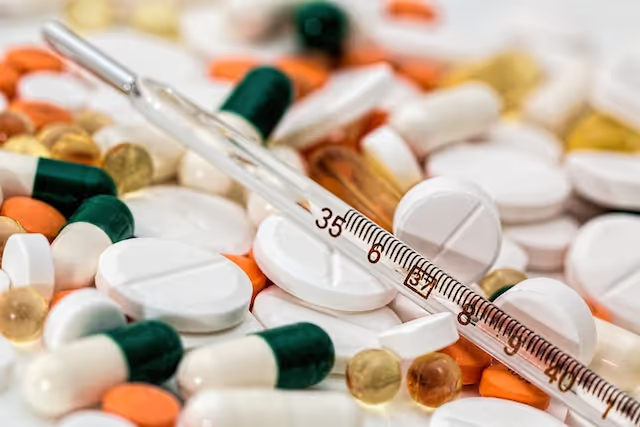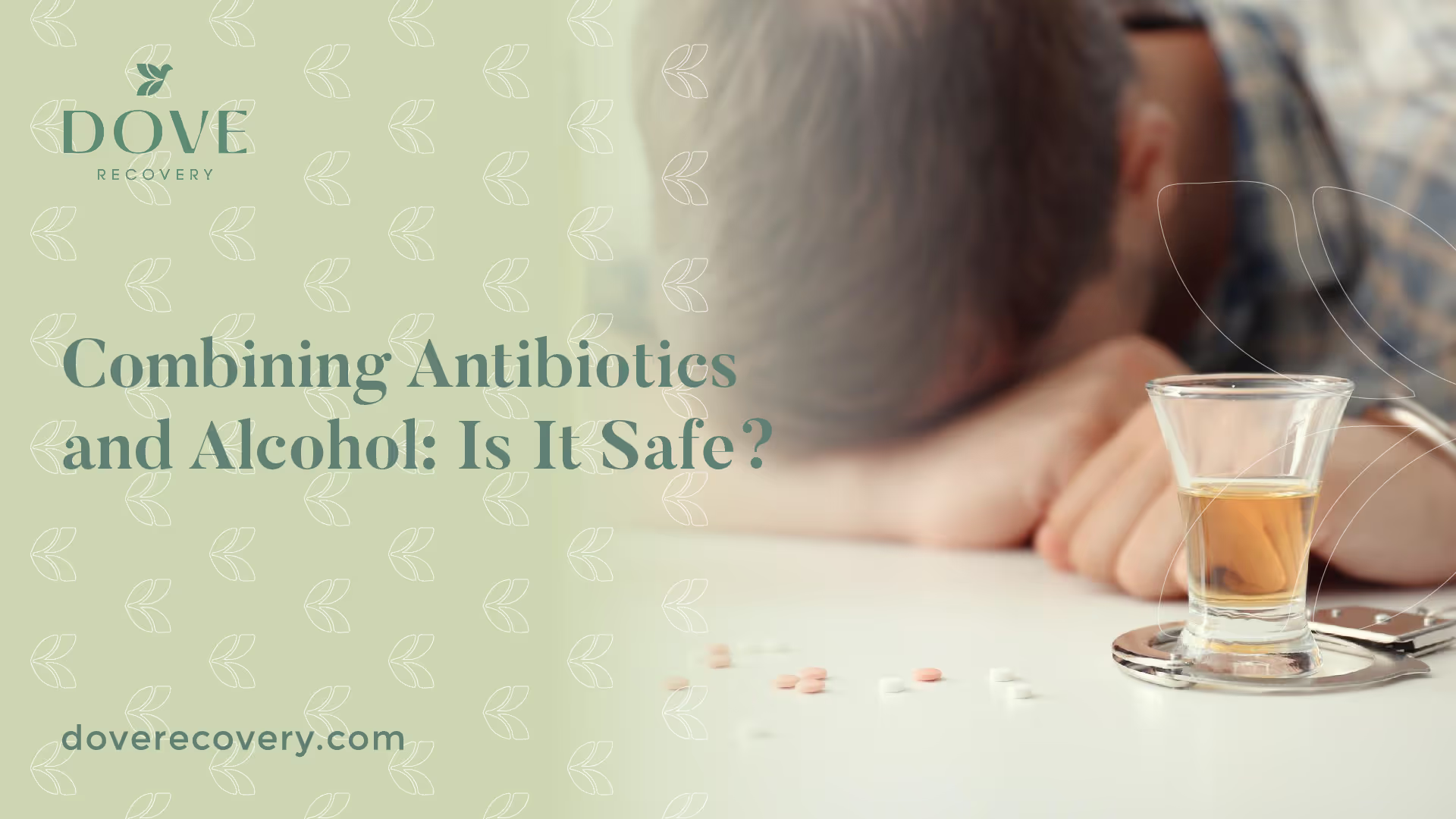Combining Antibiotics and Alcohol: Is It Safe?


Have you ever wondered whether it's safe to drink alcohol while taking antibiotics? It's a common question, and the answer isn't always straightforward. In this guide, we'll explain how antibiotics and alcohol interact, and what you need to know to stay safe.
Antibiotics and Alcohol: The Basics
So, can you drink alcohol while taking antibiotics? The answer depends on the type of antibiotics you're taking. Some antibiotics can cause unpleasant side effects when combined with alcohol, while others are safe to consume in moderation.
The main concern with mixing antibiotics and alcohol is that it can increase the risk of side effects, such as dizziness, nausea, and vomiting. This is because both alcohol and antibiotics can be hard on your liver, and combining the two can put extra strain on this vital organ.
Which Antibiotics Can You Combine with Alcohol?
The good news is that not all antibiotics interact with alcohol in the same way. Here are some common antibiotics that are generally safe to consume in moderation while drinking alcohol:
- Amoxicillin
- Azithromycin
- Cephalexin
- Doxycycline
- Metronidazole
However, it's important to note that even these antibiotics can cause side effects when combined with alcohol. For example, metronidazole can cause a severe reaction known as the "disulfiram-like reaction" when combined with alcohol, which can cause flushing, rapid heartbeat, and difficulty breathing.
Which Antibiotics Should You Avoid While Drinking Alcohol?
If you're taking any of the following antibiotics, it's best to avoid drinking alcohol altogether:
- Flagyl (metronidazole)
- Tinidazole
- Bactrim (sulfamethoxazole/trimethoprim)
- Ketoconazole
- Griseofulvin
The Side Effects Of Mixing Alcohol and Antibiotics
When taking certain antibiotics, it is important to avoid drinking alcohol. Combining these medications with alcohol can cause a range of side effects, including:
- Headache
- Nausea and vomiting
- Dizziness and lightheadedness
- Rapid heartbeat and palpitations
- Flushing and redness of the skin
- Shortness of breath and difficulty breathing
- Stomach cramps and abdominal pain
- Diarrhea or constipation
- Loss of appetite and weight loss
- Fatigue and weakness
In rare cases, combining alcohol with these antibiotics can even lead to more serious health complications. For example, some antibiotics can cause liver damage or interfere with the body's ability to process alcohol, leading to a dangerous buildup of toxins in the bloodstream. In some cases, this can lead to liver failure or other life-threatening conditions.
To avoid these risks, it is best to avoid drinking alcohol while taking antibiotics. If you have any questions about whether it is safe to drink while taking a particular medication, talk to your doctor or pharmacist for advice.
What About Antibiotic Creams and Ointments?
If you're using an antibiotic cream or ointment, it's generally safe to consume alcohol, but it's important to note that moderation is key. While these topical antibiotics are absorbed differently than oral antibiotics, it's still important to be aware of the potential risks of alcohol consumption. Drinking too much alcohol can impair your immune system and make it harder for your body to fight off infections.
It's also worth noting that some antibiotics, even when applied topically, can cause skin irritation or other side effects. If you experience any discomfort or unusual symptoms while using an antibiotic cream or ointment, it's important to talk to your healthcare provider right away. They can help you figure out whether the symptoms are related to the medication or if there's another underlying issue that needs to be addressed.
How Alcohol Affects the Body and Interacts with Antibiotics
Alcohol is a central nervous system depressant that can have a range of effects on the body. When you consume alcohol, it is absorbed into your bloodstream and distributed throughout your body. It affects the way your brain functions, slowing down your reaction time, impairing your judgment, and making it harder to concentrate.
When combined with antibiotics, alcohol can increase the risk of side effects and make it harder for your body to heal. This is because both alcohol and antibiotics are metabolized by the liver, which can become overwhelmed when too much of either substance is consumed.
Examples of negative effects
- Drinking alcohol while taking metronidazole (Flagyl) can cause severe nausea, vomiting, headache, and flushing. In some cases, it can even lead to a dangerous reaction called a disulfiram-like reaction, which can cause heart palpitations, shortness of breath, and chest pain.
- Combining alcohol with trimethoprim-sulfamethoxazole (Bactrim) can increase the risk of liver damage, especially in people who already have liver disease or who are taking other medications that affect liver function.
- Drinking alcohol while taking tetracycline antibiotics can reduce their effectiveness by up to 50%, making it harder for your body to fight off infections.
Interference with antibiotic efficacy
In addition to affecting liver function, alcohol can also interfere with the way antibiotics work in the body. For example, some antibiotics require an acidic environment in order to be effective. Drinking alcohol can reduce stomach acid levels, making it harder for these medications to work properly.
Weakened immune system
Furthermore, alcohol consumption can weaken your immune system and make it harder for your body to fight off infections. This means that if you're taking antibiotics to treat an infection, drinking alcohol can actually counteract their effectiveness.
Time Gap between Taking Antibiotics and Drinking Alcohol
If you're taking antibiotics, it's best to avoid drinking alcohol altogether. However, if you must consume alcohol, it is recommended to wait at least 48-72 hours after your last dose of antibiotics before drinking. This time gap allows your body enough time to metabolize the medication and reduce the risk of side effects caused by combining antibiotics and alcohol.
It's important to note that this recommended waiting period may vary depending on the type of antibiotic you're taking, as well as other factors such as your age, weight, and overall health status. Your doctor or pharmacist can provide more specific guidance on how long you should wait before drinking alcohol while taking antibiotics.
In general, it's best to err on the side of caution and avoid drinking alcohol until you have completed your course of antibiotics. This will help ensure that you get the full benefit of the medication and reduce the risk of any potential complications or side effects.
How Alcohol Can Reduce the Effectiveness of Antibiotics
Reduced Effectiveness
- Some antibiotics require an acidic environment to be effective. Drinking alcohol can reduce stomach acid levels, making it harder for these medications to work properly.
- Alcohol consumption weakens the immune system, making it harder for the body to fight off infections. This means that if you're taking antibiotics to treat an infection, drinking alcohol can counteract their effectiveness.
- Alcohol consumption can lead to changes in gut bacteria, which can affect how well antibiotics work.
Maintaining a Healthy Balance
- Antibiotics kill harmful bacteria and beneficial bacteria in the gut. Beneficial bacteria help keep harmful bacteria in check and are essential for maintaining a healthy immune system.
- Drinking alcohol while taking antibiotics disrupts this delicate balance and makes it harder for the body to fight off infections.
Recommendations
- Avoid drinking alcohol altogether while taking antibiotics.
- If you choose to drink, do so in moderation and wait at least 48-72 hours after your last dose of antibiotics before consuming any alcoholic beverages. This will give the body enough time to metabolize the medication and reduce the risk of potential complications or side effects caused by combining antibiotics and alcohol.
How to Stay Safe While Taking Antibiotics and Drinking Alcohol
If you're taking antibiotics and plan to consume alcohol, here are a few tips to help you stay safe:
- Talk to your doctor or pharmacist before drinking alcohol while taking antibiotics. They can advise you on whether it's safe to drink, and if so, how much you can consume.
- If you do choose to drink alcohol while taking antibiotics, consume it in moderation. Stick to one or two drinks at most, and avoid binge drinking or heavy drinking.
- Drink plenty of water before, during, and after consuming alcohol. This can help prevent dehydration and reduce the risk of side effects.
- Be aware of the side effects of your antibiotics, and stop drinking immediately if you experience any unusual symptoms.
Antibiotics and Alcohol Myths
There are many myths surrounding the combination of antibiotics and alcohol. Here are a few common ones:
- Myth 1: You can drink alcohol while taking any antibiotic in moderation. This is not true. As we mentioned earlier, some antibiotics can cause severe side effects when combined with alcohol, even in small amounts.
- Myth 2: Drinking alcohol won't affect the effectiveness of antibiotics. This is also false. Alcohol consumption can interfere with the way antibiotics work in the body, reducing their effectiveness and making it harder for your body to fight off infections.
- Myth 3: It's safe to drink alcohol if you wait a few hours after taking your medication. Waiting a few hours may not be enough time for your body to metabolize the medication properly, especially if you're taking a long-acting antibiotic.
- Myth 4: It's okay to drink more than usual as long as you're taking antibiotics. This is a dangerous myth that can put your health at risk. Combining alcohol and antibiotics can cause serious side effects and potentially life-threatening complications.
It's important to separate fact from fiction when it comes to mixing antibiotics and alcohol. If you have any questions or concerns about whether it's safe to drink while taking antibiotics, talk to your doctor or pharmacist for guidance.
Conclusion
In summary, it's generally best to avoid drinking alcohol while taking antibiotics, especially if you're taking one of the antibiotics that can cause serious side effects when combined with alcohol. However, if you do choose to drink, it's important to do so in moderation and to talk to your doctor or pharmacist first.
Resources:
- Mayo Clinic: https://www.mayoclinic.org/healthy-lifestyle/consumer-health/expert-answers/antibiotics-and-alcohol/faq-20057946
- WebMD: https://www.webmd.com/cold-and-flu/ear-infection/antibiotics-and-alcohol-interaction
